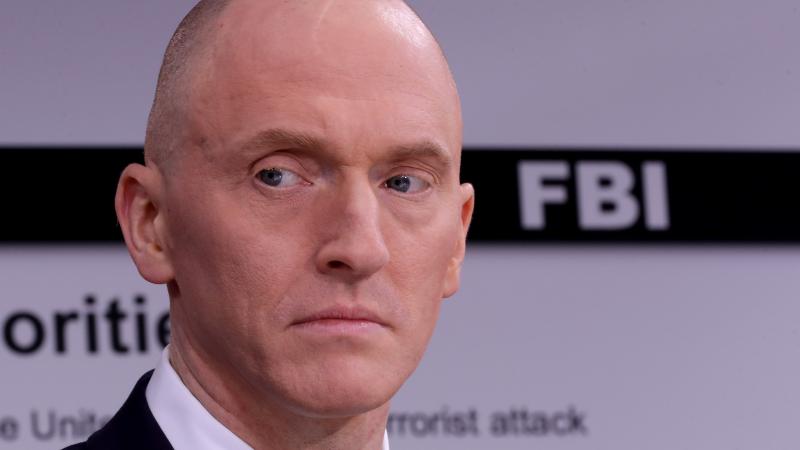Trump Factor Strikes Again: President-elect and his envoy impact Mideast before inauguration
Multiple officials tell Just the News that Trump pressure helped Qataris to quickly close Hamas-Israel ceasefire that Biden had negotiated months earlier.
Days before departing his last political job, a beleaguered Joe Biden went to the podium to announce a long-awaited ceasefire between Hamas and Israel. But when pressed by the news media over who should get credit for the deal, the 46th American president demurred.
"Is that a joke?" Biden retorted Wednesday afternoon. And moments later he walked away without providing an answer.
Half away across the globe, another world figure whose country was lead negotiator in the deal offered a clear answer: The man succeeding Biden as U.S. president had changed the dynamic and enabled a deal that had been stalled for months.
Qatar’s Minister of State told Just the News that the deal unveiled Wednesday was made possible because President-elect Donald Trump coordinated with Biden’s outgoing team, made a powerful warning to both sides to reach a deal before he was inaugurated and then dispatched his own envoy to the region, Steve Witkoff, to help seal the deal, especially with a wary Israel.
"President-elect Trump has been clear in his public statements that he wants to see an end to the war as soon as possible. These messages supported our efforts as we continued mediating between the parties to try to finalize an agreement,” Mohammed Al-Khulaifi said Wednesday night.
“Steve Witkoff in particular has been actively engaged in the discussions to get a deal over the line," the minister added. "He has been in Doha, working closely with our team to close the gaps between the two sides in the final few days.”
The deal still faces much uncertainty, and could even fall apart at some point over Israeli distrust of Hamas in the aftermath of the Oct. 7 atrocities. But its initial approval once again affirmed a Trump factor that has begun reshaping the world even before Monday’s inauguration.
Al-Khulaifi acknowledged the rarity of having a deal first negotiated by incumbent Biden pushed to fruition by his successor even before Trump took office.
Trump: "Hamas might face hell"
“There truly is no better way for an incoming administration to handle this situation,” he declared.
The deal includes a ceasefire, a pullback of Israeli troops from Gaza and the release of Hamas-held hostages, which include eight Americans, officials said. It is not known how many of the hostages will be alive or dead in the exchange, and Israel is being forced to reciprocate by releasing Hamas terrorist prisoners in an exchange.
The Qataris’ account of how the deal unfolded was confirmed by U.S. and Israeli officials, as well as Arab diplomats.
“The deal really is essentially the same as Biden struck in May. The only thing that changed was Trump entering the picture with Witkoff,” one diplomatic source directly familiar with the negotiations told Just the News. “The Biden team didn’t offer anything to change the dynamic, but Trump’s team did after the election.”
Added another diplomatic source: “Biden gets credit for conceiving the deal but his team couldn’t get the sides to agree. Trump’s clarity after the election and his envoy’s ability to deal with Israel is what changed the game.”
Newspapers across the Middle East affirmed the dynamic as details of the deal – still fragile and capable of changing – began spilling out.
“Trump envoy swayed Netanyahu more in one meeting than Biden did all year,” The Times of Israel blared in a headline.
Rep. Tom Tiffany, R-Wis., told the "Just the News, No Noise" television show Wednesday’s events affirmed once again the Trump effect globally since Election Day, especially the change in diplomatic stances from Biden’s peace through appeasement approach to Trump’s peace through strength.
“We've seen in the last four years, weakness leads to war. And now we're seeing strength leads to peace,” Tiffany said. The Wisconsin congressman specifically credited a social media post Trump made a few weeks warning that Hamas might face hell if it didn’t capitulate to a hostage release.
"Even the bad guys understand what this what it means to have President Trump come back into office.”
“I mean, the Biden administration and Tony Blinken, who has been really the person setting foreign policy for the Biden administration, could you ever imagine them speaking in such definitive tones that all hell's going to rain down on you. Hamas, if you don't figure this out. Well, guess what? They figured it out. What about four or five days before inauguration? Because they know that is exactly what's going to happen.”
Trump’s performance during the transition – from securing multibillion dollar foreign investments in the United States to pushing the Hamas-Israel deal – reminds some of Ronald Reagan’s transition from Jimmy Carter in 1981, which led to the immediate release of hundreds of American hostages from Iran.
“It's not a totally equivalent situation, because these aren't all Americans the way they were in 1981 coming out of Tehran,” former Deputy National Security Adviser Victoria Coates told the "Just the News, No Noise" television show. “But the response to a very strong American leader is the same: even the bad guys understand what this what it means to have President Trump come back into office.”
Officials said that Witkoff and Biden administration officials met in Doha with Sheikh Mohammed bin Abdulrahman Al Thani, Qatar's prime minister and foreign minister, before Witkoff dispatched separately to Jerusalem to negotiate outstanding issues with Israeli Prime Minister Benjamin Netanyahu.
The deal picked up momentum in the last few days. Biden told reporters that the deal would roll out in two steps. The first phase will span about six weeks and include “a full and complete cease-fire, withdrawal of Israeli forces from all the populated areas of Gaza, and the release of a number of hostages held by Hamas, including women and elderly and the wounded,” the president said.
"I'm proud to say Americans will be part of that hostage release in phase one as well," Biden said. "And the vice president and I cannot wait to welcome them home." Biden cautioned the situation remains delicate and fluid. "There are a number of details to negotiate the move from phase one to phase two," he said. "But the plan says if negotiations take longer than six weeks, the cease-fire will continue as long as the negotiations continue."
For all the vitriol of the last five years between Trump and Biden, the final days of the Biden presidency have seen the two men and their staffs work closely on hot spots like Gaza, Lebanon, Syria and Ukraine.
CIA cites cooperation despite policy differences that defined the presidential campaign.
Within weeks of the election, Biden’s National Security Advisor Jake Sullivan held an unannounced meeting with Trump’s choice for the post, Florida Congressman Mike Waltz. Both stressed the importance of a smooth transition as several global crises rage around the globe.
“Jake Sullivan and I have had discussions. We’ve met,” Waltz told Fox News Sunday anchor Gillian Turner.
Other Biden administration officials, like CIA Director Bill Burns, have praised the cooperation despite policy differences that defined the presidential campaign. In an appearance on NPR’s " All Things Considered" podcast, Burns said his agency has been collaborating with incoming Trump nominees, especially on ceasefire negotiations between Israel and Hamas fighters in Gaza.
“For our adversaries out there that think this is a time of opportunity that they can play one administration off the other, they’re wrong, and we are — we are hand in glove. We are — we are one team with the United States in this transition,” he continued.
Sullivan later echoed Waltz’s sentiments, nearly verbatim.
“Other actors, particularly our enemies, look at transitions as moments of opportunity… the imperative on us is to lash up more tightly than is typical and send a common, clear message to both friends and adversaries,” Sullivan told GZERO World’s Ian Bremmer in an interview.
“You know, at this point, I still think there's a chance [for a ceasefire]. I mean, I've learned the hard way not to get my hopes up. I do think there remains a chance to get a deal. And we'll certainly — in this administration — work very hard at that right up until January 20,” Burns told host Mary Louise Kelly. “And I think the coordination with the new administration on this issue has been good. So, I think there's a chance.”













